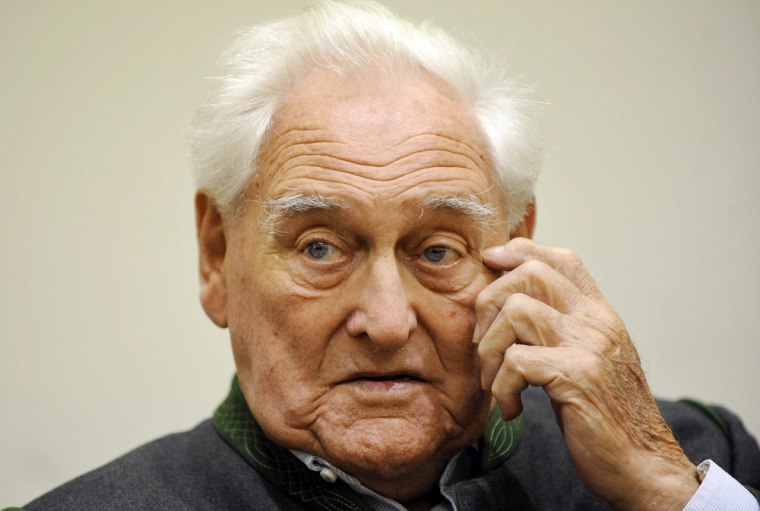A 90-year-old former officer in the Nazi army is fit enough to stand trial on charges he ordered the reprisal killings of 14 civilians in Italy during World War II, a Munich court ruled Monday.
Josef Scheungraber has denied the allegations that he ordered the June 1944 killings in Falzano di Cortona, near the Tuscan town of Arezzo, when he was a 25-year-old German Wehrmacht lieutenant in command of a company of engineers.
The indictment says he ordered his soldiers to shoot three Italian men and one woman as retribution for the killing of two German soldiers. It says he then ordered another 11 civilians be herded into a barn, which he had blown up.
One boy, 15 at the time, survived the explosion, and was expected to be among 22 witnesses at the trial. Testimony is to begin Sept. 29, and some may give statements by video link.
Already convicted in Italian court
Scheungraber is charged with 14 counts of murder. He has already been convicted of the same crimes by an Italian military court and sentenced in absentia in 2006 to life in prison, though he has served no time.
On Monday, he wore a traditional Bavarian wool jacket with deer-horn buttons, and sat with an arm resting on his single crutch as his attorney told the court that he denied the charges against him.
Defense attorney Christian Stuenkel said prosecutors had no witnesses who had seen his client at the scene of the massacre, and no written evidence of him giving any order.
He said Scheungraber at the time was in charge of overseeing the reconstruction of a bridge blown up by partisans.
"Mr. Scheungraber had been ordered to repair this bridge — outside of Falzano di Cortona — within 24 hours in order to support the German army withdrawal to northern Italy," Stuenkel said.
"This order had the highest priority for Mr. Scheungraber."
Another of Scheungraber's attorneys, Rainer Thesen, accused prosecutors of going after Scheungraber simply because he was an officer serving in the general vicinity at the time.
"He was neither at the scene of the crime, nor did he order such a crime," he told the court.
Fit to stand trial?
His attorneys had argued he was not fit to stand trial, in particular because his hearing is now so bad he would not be able to understand what is going on.
Scheungraber confirmed in court that he could understand his attorneys' arguments, however, and presiding Judge Manfred Goetzl said the trial could go ahead.
Goetzl noted that an expert had declared Scheungraber able to stand trial, though only for a few hours at a time. The judge ordered that Scheungraber's hearing-aid be connected to the court's speaker system so that he could hear better.
Joining the trial as co-prosecutors, as allowed under German law, are 19 relatives of victims of the 1944 massacre.
